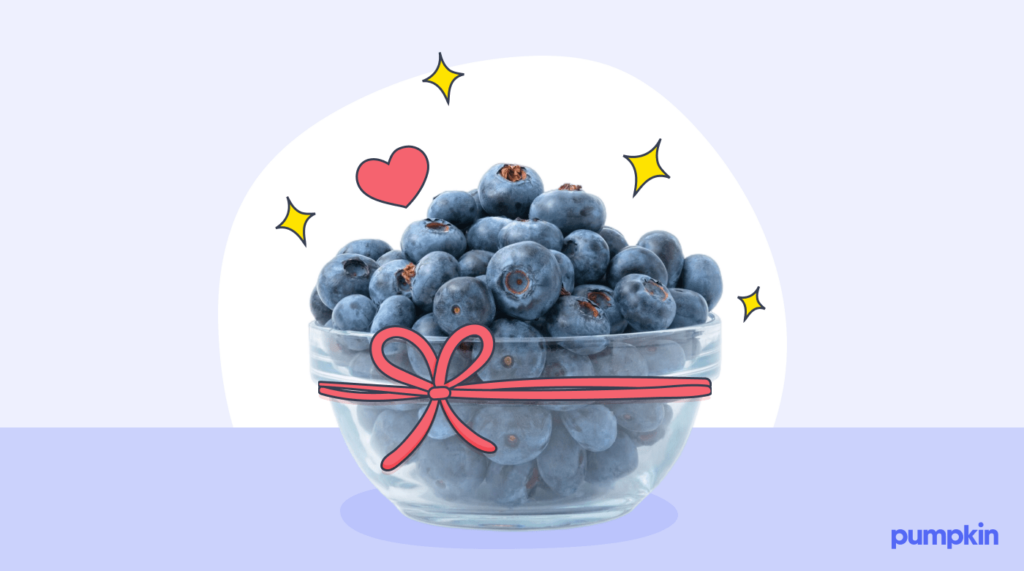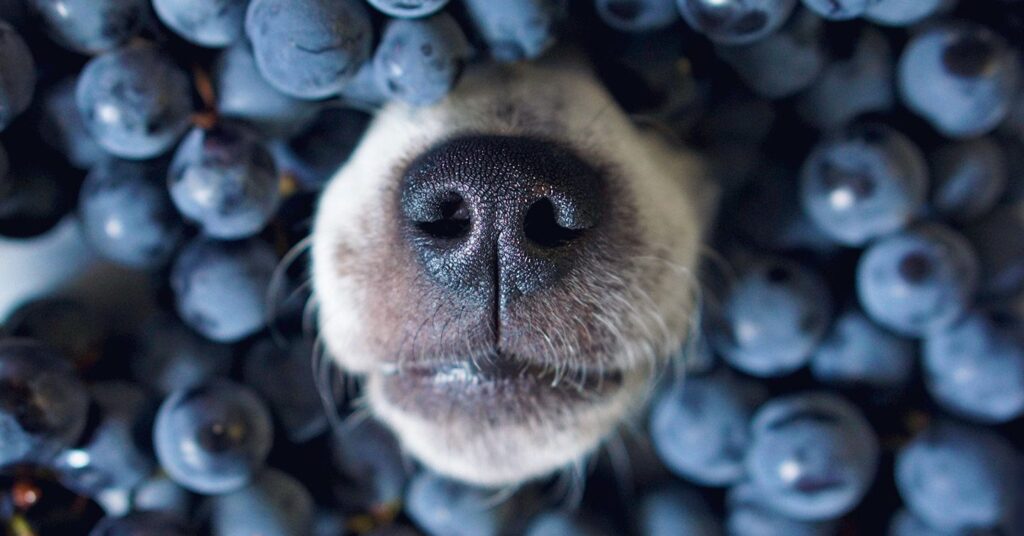Key Points:
- Yes, dogs can eat blueberries in moderation, and they’re a healthy snack or training treat.
- Blueberries are rich in vitamins C and K, fiber, and antioxidants.
- Watch the amount of blueberries you feed your dog since too much can lead to an upset stomach.
When it comes to sharing snacks with our four-legged friends, it’s essential to know what’s safe and what’s off-limits.
Enter the blueberry: a tiny, tasty superfruit bursting with antioxidants, vitamins, and fiber. Thanks to its small size, it might seem like a ready-made training treat. But can dogs have blueberries?
Yes, most dogs can eat blueberries safely. Plus, not only are blueberries safe for our pups, but they’re also packed with health benefits that can keep them feeling their best. They’re low in calories too, making them a guilt-free snack if your vet has been not so subtly hinting that your perfect pup is a tad overweight.
So, grab a handful for yourself, and let’s explore what you need to know about feeding blueberries to your dog, how many they can eat, and possible risks.
Meet the power-packed blueberry
Blueberries are native to North America, and wild blueberries are a common sight in the Northeast, Great Lakes region, and Appalachians. Wild or store-bought, they’re packed with dietary fiber, vitamins, and minerals that make them a healthy snack. In fact, this superfood has higher amounts of antioxidants and less sugar than most other fruits.
Blueberries are also a natural source of nutrients such as:
- Vitamin C
- Vitamin K
- Manganese
- Calcium
- Phosphorus
- Potassium
- Magnesium
Health benefits of blueberries for dogs

The nutrients, fiber, and vitamins in blueberries can help support your pup’s health in lots of ways. Let’s explore a few of the most important.
Blueberries support heart health
In people, consuming blueberries is linked to improved heart health, normalized blood pressure, and lowered risk of heart attacks. According to veterinarian Dr. Sarah Wooten, DVM, blueberries likely benefit your dog’s heart health as well, though dogs don’t usually consume enough of them to get the same benefits that you would. Blueberries are also full of anti-inflammatory compounds that benefit your dog’s health. Inflammation is the root cause of many chronic canine diseases and painful conditions. That means reducing inflammation can improve your dog’s overall health and lower their risk of pain and discomfort.
Blueberries have healthy fiber
Since blueberries are high in fiber, they help support beneficial gut bacteria. This reduces the risk of obesity and supports your pet’s digestive health and immune system. A strong digestive system lowers the risk of diarrhea or constipation, which can put a damper on any pet parent’s day — not to mention give you a hefty vet bill.
A nutrient-dense superfood
The humble blueberry is also a good source of vitamins C and K and manganese, which help boost your dog’s immune system, reduce inflammation, increase bone density, and support the skin, coat, muscles, and nerves. Calcium, phosphorus, potassium, and magnesium support bone growth and the body’s ability to use nutrients more efficiently.
Blueberries are rich in antioxidants
Antioxidants are compounds that fight the free radicals responsible for molecular and cell damage. Blueberries contain the antioxidant anthocyanins, which give blueberries their deep blue color and help protect against diabetes, cancer, and heart disease. They also contain phytonutrients such as flavonoids and resveratrol, which can help with a broad range of health conditions. The phytonutrients in blueberries, like flavonoids, have been shown to decrease pre-cancerous changes and reduce inflammation and DNA damage.
How many blueberries can I give my dog?

Like many good things, you can go overboard when giving your dog blueberries. Yes, they’re a healthy and tasty treat that can get your dog’s tail wagging, how much is too much?
Feeding food and treats in moderation (even healthy treats like blueberries) is the key to preventing digestive distress in your dog. A good rule of thumb is to use them only as a treat and never as a main part of your dog’s diet.
- Small dogs can be satisfied with two to three blueberries per day
- Medium-size dogs can have four to seven blueberries per day
- Large dogs can have eight to 10 blueberries
If blueberries are a new food in your dog’s diet, take care to introduce them gradually. As always, check with your vet before making changes to your dog’s diet, especially if your pup has a medical condition.
Risks of feeding blueberries to dogs
Here are some things to look out for when you first feed this superfood to your furry friend:
- Allergic reactions: Although allergic reactions in pets to blueberries are rare, watch for itching, swelling, or gastrointestinal issues.
- Digestive issues: Feeding too many blueberries to your dog can lead to diarrhea or vomiting. Start with fewer than you would normally use for a treat, and watch how your pup handles them.
- Choking: Blueberries are small; as such, they can be a choking hazard — especially for smaller dogs and puppies. Cut them in half to be extra safe.
- Elevated blood sugar: Blueberries contain small amounts of natural sugars. Limit the number of berries you use as treats for overweight pups.
How to prepare blueberries for your dog

Preparing and feeding blueberries to dogs is simple, but it’s important to do it the right way. As with any fruit or vegetable, the first step is to wash your blueberries thoroughly. This will remove any hidden dirt, pesticides, or contaminants that could hurt you or your dog.
Here are some more tips:
Always choose fresh or frozen berries: Look for firm, plump blueberries without mold.
Avoid processed blueberry products: While your pet might beg for your blueberry muffin or pie, don’t give in! They might contain artificial sweeteners that are toxic to dogs, like xylitol. Processed products often have added sugars, salt, and preservatives that can cause an upset stomach, diarrhea, or vomiting.
Watch your portions: The right portion size depends on your dog’s size. Since not all dogs like the tart flavor of blueberries, you may want to add them to your homemade treats while still taking care to count the berries in each serving.
Homemade treats: Blueberries can be mixed in with your pup’s favorite treats, such as those with a banana or apple base. Look for recipes with just a few ingredients to reduce the potential of upsetting your pup’s digestive system.
Frozen treats: Consider adding blueberries into frozen treats, especially on hot summer days. For a DIY blueberry pupsicle, purée berries, bananas, and a small amount of plain, unsweetened yogurt. Pop the mixture in a popsicle mold and freeze.
Can your puppy have blueberries, too?
Yes, puppies can have blueberries, too. However, as with adult dogs, moderation is key. Introduce these fruits to your puppy slowly to ensure their digestive system can tolerate them, and, as mentioned earlier, consider cutting them into smaller pieces to help prevent choking.
Blueberry alternatives: What are your choices?

If you’ve ever eaten a blueberry, you know they can be tart. Some dogs just don’t like the taste. In this case, you may be looking for another option. Here are some appropriate substitutes, but keep in mind that most of them have higher sugar content:
Strawberries: Like all of the fruits on this list, strawberries should be eaten in moderation, and avoid feeding your dog the leaves or stems. Too many strawberries can lead to diarrhea due to the high sugar content.
Apples: Most dogs love apples, but avoid feeding them the core and seeds, as these parts contain cyanide.
Bananas: Bananas are high in vitamins C and B6, potassium, and fiber. Avoid feeding the peel, as it’s hard to digest.
Blackberries: Some dogs just don’t like the tart taste of blackberries. If yours loves them, cut larger ones in half to reduce the risk of choking.
Raspberries: Raspberries are high in fiber and vitamins C and K. They’re also tart, like blueberries, so your pup might not like them as much as other, sweeter options.
Cranberries: Cranberries aren’t just for Thanksgiving. Dogs can eat them in moderation when they’re dried or fresh. Avoid feeding cranberry sauce or juice, though, because these are high in sugar. Over-eating cranberries can also cause bladder stones in dogs.
The final word: Blueberries and your dog
Blueberries are high in vitamins, fiber, and antioxidants, and they’re also low in sugar and calories. In small amounts, they’re a healthy treat for dogs and puppies, but in larger quantities, they can trigger an upset stomach. We always recommend asking your vet before adding new foods to your pet’s diet, especially if they have a medical condition.
Offering your dog or puppy new foods can be fun for both of you. However, unexpected side effects and reactions can lead to big vet bills. Check out Pumpkin dog insurance plans to see how they can give you peace of mind and help you afford the best care for your pup when illnesses, accidents (or snaccidents!) happen.
FAQs
- Yan,Lin. (2023, September 11). Blueberries and Health. Agricultural Research Service US Department of Agriculture. https://www.ars.usda.gov/plains-area/gfnd/gfhnrc/docs/news-articles/2014/blueberries-and-health/
- McCarthy McPhaul, Meghan. (2022, August 6). Wild Blueberries: A Primer. New York Almanack. https://www.newyorkalmanack.com/2022/08/wild-blueberries/
- Khoo, H. E., Azlan, A., Tang, S. T., & Lim, S. M. (2017). Anthocyanidins and anthocyanins: colored pigments as food, pharmaceutical ingredients, and the potential health benefits. Food & nutrition research, 61(1), 1361779. https://doi.org/10.1080/16546628.2017.1361779
- Meng, X., Zhou, J., Zhao, C. N., Gan, R. Y., & Li, H. B. (2020). Health Benefits and Molecular Mechanisms of Resveratrol: A Narrative Review. Foods (Basel, Switzerland), 9(3), 340. https://doi.org/10.3390/foods9030340
- Tran, P. H. L., & Tran, T. T. D. (2021). Blueberry Supplementation in Neuronal Health and Protective Technologies for Efficient Delivery of Blueberry Anthocyanins. Biomolecules, 11(1), 102. https://doi.org/10.3390/biom11010102
DISCLOSURE




